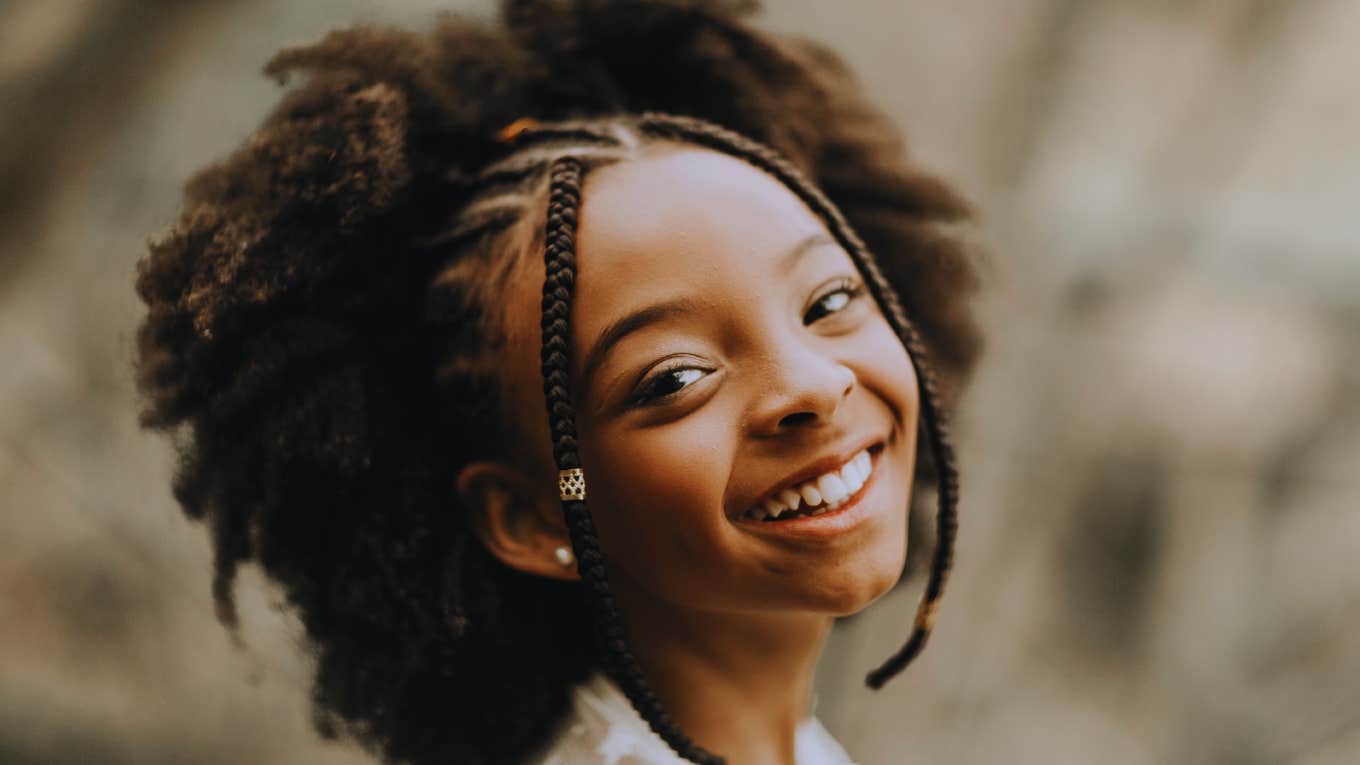My Daughter Is Gorgeous, And I Wish She Wasn’t
In retrospect, I’m thankful I was a goofy-looking child.
 Misha Voguel | Canva
Misha Voguel | Canva I got catcalled the other day. My walking companion and I passed by a man, who may have been in his 30s and who may have been drunk at 2-something p.m. He brightened up considerably as we passed, let out a low whistle, and said something about “fine young ladies.”
I found catcalls in my 20s and 30s annoying, at best; the rare catcall in my 40s is simply amusing. But this time, I wasn’t laughing.
This time, my walking companion was my nine-year-old daughter.
She doesn’t look nine years old. Most people guess at least 12. With warm brown skin and shiny ringlets that shoot and cascade from her head like a fountain, she looks like the stunning young multiracial woman who is ubiquitous in stock photos but less frequently spotted in the wild. (Not too dissimilar from the harried stock photo mom who is inexplicably wearing a crisp, white button-down and has found time to get her nails done.)
Through no fault of her own, my daughter is hurtling toward womanhood too fast for my comfort, and I find myself faced with the thankless task of teaching her the burden that comes with beauty, particularly at such a young age.
As a child, I longed to be beautiful, because girls are taught that this is something to long for.
My younger sister was the looker in our family, somehow inheriting a Mediterranean complexion from our pale-skinned parents.
Meanwhile, my skin bordered on translucent. In the summer, despite my avid use of sunscreen, I would come home from the beach with scarlet red splotches across my knees and arms and darkening freckles that threatened to consume my face.
My eyes were small and squinty, and my closely cropped hair did me no favors in the cuteness department. Oh, and did I mention my buck teeth? Yep, my two front teeth protruded from my gums at an impressive angle, and with a gap so large between them, many people assumed the space was on account of a missing tooth.
My Gerber baby sister blossomed into a round-faced child with a button nose and straight, thick shoulder-length hair that shone when you brushed it. Adults told my parents, in front of me, that she should pursue a modeling career. Boys in my elementary school class asked me why I wasn’t as pretty as my sister.
When I finally grew out my hair, that helped, but I had no idea how to tame it. My parents thought it was wildly funny to tell everyone they knew that I brushed my hair with an eggbeater.
In middle school, I discovered LA Looks Megahold hair gel, and things got a little better. But I was suddenly short. My friends were all growing around me, both in their height and bosoms. I failed to grow in either department. My doctor suggested bloodwork to make sure I didn’t have a growth disease.
I had no disease; I was just a late bloomer. But being a late bloomer felt like a disease in my book. I nodded along as friends complained about periods and the sensitivity of their swelling breasts. I bought a training bra on principle, even though I didn’t need it.
As a high schooler, I was all elbows and knees, skinny, scrappy, and still short. Thankfully, I no longer had buck teeth, but the struggle to confine them to a proper angle raged on. I decorated my braces with purple rubber bands, which did nothing to enhance the visual aesthetic but did help reinforce my temporarily chosen identity as The Girl Who Loves Purple.
It wasn’t until my early 20s that I began to think of myself as somewhat pretty. And in hindsight, my early 20s were an ideal time to become somewhat pretty. I had the emotional maturity to understand what men were after, whether sinister or well-intentioned, and the confidence to fend them off, if need be. I also understood how to use being pretty to my advantage, whether for bartending tips or for donations to the nonprofit I’d co-founded, without compromising my self-respect.
Before having kids, I harbored a ridiculous and irrational fear that my children would be ugly.
I was furious with myself for caring about something so superficial, but I wanted cute kids, dammit, whether or not it mattered in the grand scheme of things.
Be careful what you wish for. Strangers frequently stop my husband and me in the street to tell us what beautiful children we have. Now, as my daughter’s body lengthens and grows curves, I wish the eyes of strangers would stop lingering. I don’t want her sense of self-worth to be tied up in attracting attention from passersby.
I think of all the energy she will have to invest in “dealing with” boys (and day-drunk men in their 30s) that she could be investing elsewhere. And I think of how hard it will be to even know how to “deal with” boys (and day-drunk men in their 30s) when her body has darted so far ahead of her heart and mind.
My husband and I do what we can to prepare her for the attention she will only get more of, but also to take the focus off her beauty — at least in our home. We don’t talk about it much. Instead, we frequently emphasize how smart and strong she is. Perhaps we can’t stop her from stopping strangers in their tracks, but at least we can teach her that she has a lot to offer beyond a stunning face.
Kerala Taylor is an award-winning writer and co-owner of a worker-owned marketing agency. Her weekly stories are dedicated to interrupting notions of what it means to be a mother, woman, worker, and wife. She writes on Medium and has recently launched a Substack publication Mom, Interrupted.
